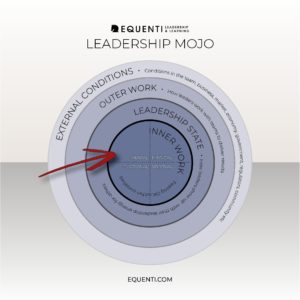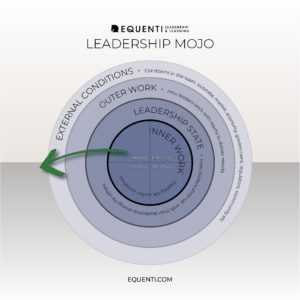
My daily leadership coaching conversations reveal the common complaint by leaders that the challenges in navigating changing and difficult business conditions have an impact on the leadership state we offer our teams – and ultimately, how we feel about ourselves and whether we are ‘good enough’ for our leadership roles.
Some of the common narratives about the external conditions under which we operate, and how these affect our leadership state and sense of self, sound like this:
- ‘The regulator has imposed new requirements, the market has shifted, competition has increased and we’re now looking for revenue in new corners of the market. Our leaders are struggling with the strategic response, and we see the leadership team pointing fingers and covering mistakes, rather than working effectively together to facilitate a visionary organisational response. I’m really not proud of how we are responding as leaders.’
- ‘We have a new CEO who is very financially focussed. Leaders are being asked to work smarter, and with more agility, and many are crumbling under the pressure. What we’re seeing is leaders trying to position themselves for job security, rather than leading their teams in ways which seek opportunities to grow revenue and work smarter. We’re really operating from a place of fear and resentment, rather than opportunity.’
- ‘My team just isn’t gelling, which is not only affecting the quality of work we do together, but my desire to lead them at all. This makes it hard for me to feel like a good leader.’
These very common leadership complaints reflect an external locus of control in leadership – the idea that conditions in the market, business and team (which are all external to the leader themselves) are the primary determinant of our leadership state.
The implication is that the ‘external conditions’ in the market, business or team impact the quality of work we do as a team (the ‘outer work’ of leadership), which affects the ‘leadership state’ I offer my team. When those external conditions are challenging, we don’t work as well, and my leadership state suffers, I also begin to doubt whether I’m really OK as a person and if I’m really good enough at this leadership stuff.
An external locus of control says that how we think and feel as a leader is determined primarily by the external conditions imposed upon us.

The consequences for a leader with an external locus of control, is that we feel buffeted by the constantly changing conditions in the market, and their effects on the business and team. We become exhausted by continual change, we feel like it’s hard to ‘get ahead’ and we get stuck in a reactive pattern of simply rebounding to the next challenge. We lose our sense of forward progress, struggle to offer a compelling vision for the future and we’ll always be battling to offer a positive and steady leadership state under these circumstances. It feels like life and business is being imposed upon us, and we’re powerless to influence those conditions.
The challenge in our leadership coaching conversations is to turn this external locus of control ‘inside out’ to reflect an internal locus of control.
To achieve this, we must first understand that if we can create a stable foundation, by resourcefully attending to our mental, physical, emotional and spiritual health, we will be much more able to choose a functional and steady leadership state under any conditions.
When we’re doing the inner work of leadership, we feel rock solid in our worth as both a person and a professional. On this basis, we can more effectively choose a functional, resourceful and steady leadership state which allows us to do better work with our teams, and ultimately we’re better able to influence the external conditions in the team, business and perhaps even the market.

So, when we’re thinking about how to become better leaders by offering great Leadership Mojo to our teams, no matter the conditions, we can ask ourselves this key question:
Are we doing the inner work to establish a steady internal platform for our leadership, or are we allowing constantly changing external conditions to determine our leadership state?
The choice is yours. If you’d like some help with your Leadership Mojo, just reach out: angela@equenti.com
